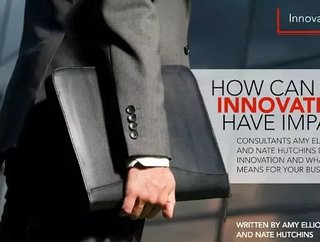How Can Innovation Have Impact?

Click here to read this article in the November issue of Business Review USA!
Written by Amy Elliott Hemeter and Nate Hutchins
For the last few years, the business press and experts have stressed the strategic criticality of innovation. However, as we consider investing your scarce resources in innovation, should we all step back and ask ourselves “What exactly is innovation?” And more particularly: “How can and does innovation have impact?”
Look toward the business press for the answer and it may actually cause even more confusion. For example, if you search for Forbes’ or Bloomberg Business Week’s lists of the greatest innovations, you will find they contain mobile phones, laptop computers, ATMs, and stents. But is innovation only about inventions? Instead, it should be about finding ways to deliver new benefits to our clients or perhaps existing benefits at significantly lower fees– with or without breakthrough technology.
Take the air transportation industry as an illustration. In 2001, Boeing unveiled its plan to build the Sonic Cruiser. This technical wonder would have cut transatlantic flight time from 7 hours to 5½ hours – a substantial improvement -- but at a premium price of $10,000 compared to $5,000 for a first class ticket on flights in conventional planes. Yet when considering transit time, including ground transportation to and from airports to city centers, the total travel time from downtown London to downtown New York would only have been reduced from 12 hours to 10½ hours.
Around that time, a surprise competitor entered the market: semi-private time-share jets. Instead of cutting flight time through technology, these jets provided shorter on-the-ground time by flying from London’s Northolt to Teterboro, New Jersey, while avoiding the many delays associated with commercial flights and major airports. This enabled the time-share jets to cut total travel time to 9 hours, at a per passenger cost of just $7,500. As noted by sources such as The Economist, Boeing ended up shelving its technology-based solution, while the time-share jets – which were the business model innovators – took off.
Since the Wright Brothers’ first flight in Kitty Hawk, there have been countless technological inventions that made air flights more efficient than driving. However, since the formation of the first commercial airline, numerous business model innovations have become just as important by making air travel into a simple commodity that many of us can’t do without.
The most important takeaway for entrepreneurs may be this: don't see innovation as simply the vast array of technologies now on the scene, invented by others and available for your use. Instead, combine a distinctive and innovative business model of your own making with the useful enabling technologies. In that way, you’ll have a real shot at delivering novel benefits to your clients, thus ensuring innovation offers all stakeholders the most positive impact.
Amy Elliott Hemeter and Nate Hutchins are Principals at the innovation consulting firm Strategos, a division of Innovaro. To learn more, visit www.strategos.com.






